小学英语总复习宝典
三年级第二学期期末复习宝典-英语
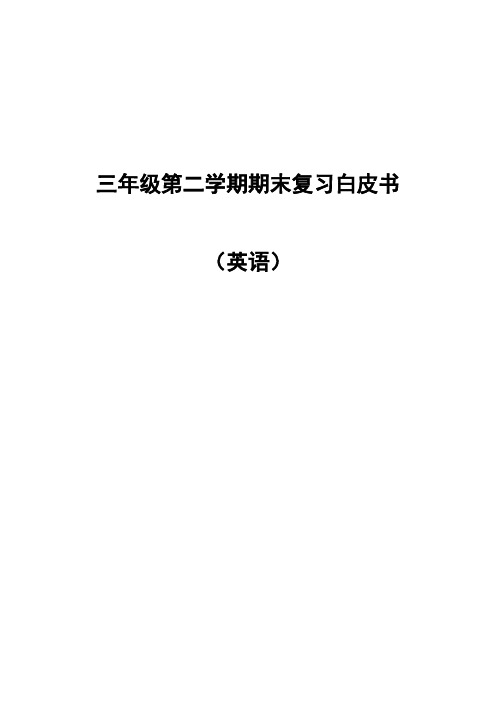
三年级第二学期期末复习白皮书(英语)目录期末各单元知识点复习 (2)各单元重点句型 (12)三年级下学期知识重点总汇 (15)期末真题测试卷(一) (17)期末真题测试卷(二) (22)期末各单元知识点复习第一单元In class在上课【总目标:能使用简单的祈使句表达一些上课的交际用语】一、词汇in class在上课please请open开close关上the这、这个door门sorry对不起come in 进来window窗户rubber橡皮parrot鹦listen to听don’t=do not 不要二、句型及语法1、习惯搭配/短语Good morning,class.早上好,同学们。
Stand up. 起立。
Sit down, please. 请坐。
Open the door. 开门。
Open/close the book 打开/合上书。
Close the window. 关窗。
Look at the blackboard. 看黑板。
Come in. 请进。
Off we go.我们一起走。
I’m sorry. 对不起。
(用于表达歉意)Listen to… 听…Listen to me/him/Liu Tao/the parrot/the teacher...(听我/他/刘涛/鹦鹉/老师...)2、the的用法the是定冠词,用来特指人或事物。
所指的人或事物是同类中特定的一个。
可以和单、复数名词,也可以和不可数名词连用。
例:the apple 这个苹果(许多的苹果中,特指这一个苹果,而不是其他的苹果。
)3、Mr,Miss和Mrs的用法对男士的尊称为Mr… (…先生)Miss 小姐(是对未婚妇女的称呼)Mrs 太太、夫人(是对已婚妇女的称呼)4、询问“这/那是什么?”的句型及其答句What’s this/that ?It’s a/an…5、Don’t引导的祈使句结构:①Don’t + 动词原形+其他Don’t listen to the parrot.不要听鹦鹉的。
六年级学生英语复习提分宝典
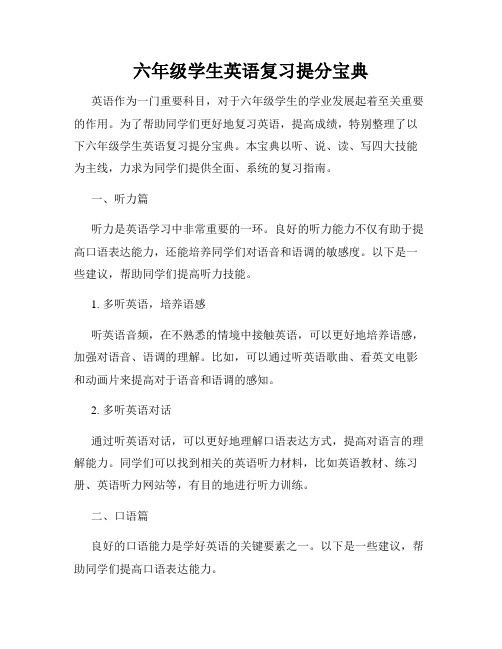
六年级学生英语复习提分宝典英语作为一门重要科目,对于六年级学生的学业发展起着至关重要的作用。
为了帮助同学们更好地复习英语,提高成绩,特别整理了以下六年级学生英语复习提分宝典。
本宝典以听、说、读、写四大技能为主线,力求为同学们提供全面、系统的复习指南。
一、听力篇听力是英语学习中非常重要的一环。
良好的听力能力不仅有助于提高口语表达能力,还能培养同学们对语音和语调的敏感度。
以下是一些建议,帮助同学们提高听力技能。
1. 多听英语,培养语感听英语音频,在不熟悉的情境中接触英语,可以更好地培养语感,加强对语音、语调的理解。
比如,可以通过听英语歌曲、看英文电影和动画片来提高对于语音和语调的感知。
2. 多听英语对话通过听英语对话,可以更好地理解口语表达方式,提高对语言的理解能力。
同学们可以找到相关的英语听力材料,比如英语教材、练习册、英语听力网站等,有目的地进行听力训练。
二、口语篇良好的口语能力是学好英语的关键要素之一。
以下是一些建议,帮助同学们提高口语表达能力。
1. 练习朗读选择一些自己喜欢的英语文章,可以是课文或是英语小故事,按照正确的语音、语速朗读,培养语感和节奏感。
2. 学习口语表达积累常用的口语表达,例如常用的问候语、感谢、道歉和请求等。
通过模仿和练习,熟练运用于日常生活中。
三、阅读篇阅读是提高英语能力的重要途径,通过阅读可以拓宽词汇量、提高文化素养和语言理解能力。
以下是一些建议,帮助同学们提高阅读能力。
1. 阅读有趣的故事和文章选择一些有趣的英语故事和文章,涉及不同主题和领域,帮助同学们培养阅读兴趣。
在阅读过程中,注意理解其中的核心内容及关键词汇。
2. 利用字典和词汇卡片遇到不认识的单词时,及时查阅字典并制作复习卡片。
将复习卡片放在固定时间段进行复习,帮助同学们牢记并巩固单词的意思和用法。
四、写作篇写作是英语学习的重要组成部分,通过写作可以巩固语法知识,锻炼表达能力。
以下是一些建议,帮助同学们提高写作水平。
人教版小学英语3、4、5年级复习资料总复习

人教版小学英语3——5年级复习资料总复习一:学生易错词汇1. a, an的选择: 元音字母开头的单词用an,辅音字母开头的单词用a.2. am , is , are的选择: 单数用is , 复数用are. I 用am , you 用are.3. have , has 的选择: 表示某人有某物。
单数用has , 复数用have.I ,you 用have .4. there is, there are 的选择:表示某地有某物,某人。
单数用there is , 复数用there are.5. some, any 的选择:肯定句用some, 疑问句和否定句用any.6. 疑问词的选择:what (什么) who (谁) where (哪里) whose (谁的) why(为什么)when(什么时候)which(哪一个)how old (多大) how many (多少)how much(多少钱)二:动词现在分词详解动词的ing形式的构成规则:①一般的直接在后面加上ing , 如doing , going , working ,singing , eating②以e 结尾的动词,要先去e再加ing,如having , writing③双写最后一个字母的(此类动词极少)有:running , swimming , sitting , getting三:人称和数人称代词物主代词主格宾格第一人称单数 I(我) me my(我的)复数 we(我们) us our(我们的)第二人称单数 you(你) you your(你的)复数 you(你们) you your(你们的)第三人称单数 he(他) him his(他的)she(她) her her(她的)it(它) it its(它的)复数 they(他们/她们/它们) them their(他们的/她们的/它们的)四:句型专项归类1、肯定句:是指用肯定的语气来陈述的句子,如:I’m a student.She is a doctor. He works in a hospital.There are four fans in our classroom. He will eat lunch at 12:00. I watched TV yesterday evening.2、否定句:含有否定词或表示否定意义词的句子,如:I’m not a student. She is not (isn’t) a doctor.He does not (doesn’t) work in a hospital.There are not (aren’t) four fans in our classroom.He will not (w on’t) eat lunch at 12:00.I did not (didn’t) watch TV yesterday evening.☆注意☆小结:否定句主要是在肯定句的基础上加上了否定词“not”。
小学英语总复习资料完整版

小学英语总复习资料完整版文稿归稿存档编号:[KKUY-KKIO69-OTM243-OLUI129-G00I-FDQS58-小学期间重要词汇:学习用品(school things):pen钢笔pencil铅笔pencil-box铅笔盒ruler尺子book书bag包 schoolbag书包eraser 橡皮 crayon 蜡笔comicbook漫画书postcard明信片newspaper报纸storybook故事书notebook笔记本Chinesebook语文书Englishbook英语书mathbook数学书magazine杂志dictionary词典人体(body):foot脚head头face脸hair头发nose鼻子mouth嘴eye眼睛ear耳朵arm 手臂hand手finger手指leg腿tail尾巴颜色(colours):red红blue蓝yellow黄green绿white白black黑pink粉红purple紫orange橙brown棕动物(animals):cat猫dog狗pig猪duck鸭rabbit兔horse马elephant大象ant蚂蚁fish鱼bird鸟snake蛇mouse老鼠(mice 复数)monkey猴panda熊猫bear熊lion狮子tiger老虎fox狐狸zebra斑马deer鹿giraffe长颈鹿goose鹅hen母鸡turkey火鸡lamb小羊sheep绵羊goat山羊cow奶牛人物(people):friend朋友boy男孩girl女孩mother(mum)母亲father(dad)父亲sister 姐妹brother兄弟uncle叔叔;舅舅aunt姑姑 man男人woman女人Mr.先生Miss小姐lady女士;小姐parents父母grandparents祖父母grandma/grandmother(外)祖母grandpa/grandfather(外)祖父cousin堂(表)兄弟;堂(表)姐妹son儿子daughter女儿baby婴儿kid小孩classmate同学penpal笔友tourist旅行者people人物robot机器人职业(jobs):teacher教师student学生doctor医生nurse护士cook 厨师 driver司机farmer农民singer歌唱家writer作家actor男演员actress女演员artist画家TVreporter电视台记者engineer工程师cleaner清洁工basketballplayer篮球运动员factory worker 工厂工人 postman 邮递员 businessman 商人 post officer 警察fisherman 渔民 scientist 科学家 pilot 飞行员 coach 教练食品,饮料(food&drink):rice米饭bread面包beef牛肉milk牛奶water水egg蛋fish 鱼tofu豆腐cake蛋糕hotdog热狗hamburger汉堡包Frenchfries炸薯条cookie曲奇biscuit饼干jam果酱noodles面条meat肉chicken鸡肉pork猪肉mutton羊肉vegetable蔬菜salad沙拉sandwich 三明治soup汤ice冰ice cream冰淇淋Coke可乐juice果汁tea茶coffee咖啡breakfast早餐lunch午餐dinner/supper晚餐meal一餐水果,蔬菜(fruit&vegetables):apple苹果banana香蕉pear梨orange橙watermelon西瓜grape葡萄eggplant茄子greenbeans青豆tomato西红柿potato土豆peach桃strawberry草莓onion洋葱carrot胡萝卜cabbage卷心菜衣服(clothes):jacket夹克衫shirt衬衫T-shirt丅恤衫skirt短裙子dress连衣裙jeans牛仔裤pants长裤socks袜子shoes鞋子sweater毛衣coat上衣shorts短裤hat(有沿(de))帽子cap便帽sunglasses太阳镜tie领带scarf围巾gloves手套umbrella 雨伞 cloth布交通工具(vehicles):bike自行车bus公共汽车train火车boat小船ship轮船car小汽车taxi出租车plane飞机subway地铁on foot 步行杂物(otherthings):window窗户door门desk课桌chair椅子bed床computer计算机blackboard黑板fan风扇light灯teacher'sdesk讲台picture图画;照片wall墙壁floor地板football/soccer足球phonesofa沙发fridge冰箱table桌子TV电视key钥匙photo照片plate 盘子bowl碗knife刀fork叉spoon勺子chopsticks筷子gift礼物toy玩具key 钥匙 map地图ball球balloon气球kite风筝box盒子umbrella伞violin 小提琴menu菜单e-mail电子邮件trafficlight交通灯money钱medicine药地点(locations):home家room房间bedroom卧室bathroom卫生间livingroom起居室kitchen厨房classroom教室school学校park公园library图书馆postoffice邮局policeoffice警察局hospital医院cinema电影院bookstore书店farm农场zoo动物园办公室library图书馆gym体育馆bathroom卫生间artroom绘画教室computerroom计算机教室musicroom音乐教室TVroom电视机房company公司factory工厂petshop宠物商店naturepark自然公园themepark主题公园sciencemuseum科学博物馆theGreatWall长城supermarket超市 restaurant餐馆bank银行country国家village乡村city城市hometown家乡busstop公交车站课程(classes):Chinese class语文math class数学PE class体育课English class英语课music class 音乐课 art class 美术课国家,城市(countries&cities):China中国America/USA美国UK联合王国England英国Canada加拿大Australia澳大利亚NewYork纽约London伦敦Sydney悉尼Moscow莫斯科气象天气(weather):cold寒冷(de)warm温暖(de)cool凉爽(de) hot 热(de)snowy下雪(de)sunny晴朗(de)rainy下雨(de)windy有风(de)cloudy多云(de)weatherreport天气预报景物(nature):river河流lake湖泊forest森林road公路house房子bridge桥building建筑物rain雨cloud云sun太阳mountain山 hill 小山sky天空rainbow彩虹wind风air空气moon月亮植物(plants):flower花grass草tree树plant植物rose玫瑰leaf叶子星期(week):Monday星期一Tuesday星期二Wednesday星期三Thursday星期四Friday星期五Saturday星期六Sunday星期天weekend周末月份(months):Jan.(January)一月Feb.(February)二月Mar.(March)三月April四月May 五月June六月July七月Aug.(August)八月Sept.(September)九月Oct.(October)十月Nov.(November)十一月Dec.(December)十二月季节(seasons):spring春summer夏fall/autumn秋winter冬方位(directions):south南north北east东west西turn left(at)左边 turn right(at)右边go straight 直走患病(illness):haveafever发烧hurt疼痛haveacold感冒数词(numbers):one一two二three三four四five五six六seven七eight八nine九ten十eleven十一twelve十二thirteen十三fourteen十四fifteen十五sixteen十六seventeen十七eighteen十八nineteen十九twenty二十thirty三十forty四十fifty五十sixty六十seventy七十eighty八十ninety九十forty-two四十二hundred百one/ahundredandthirty-six一百三十六first第一second第二third第三fourth第四fifth第五eighth第八ninth第九twelfth第十二twentieth第二十thirtieth第三十形容词(adj.):big大(de)small小(de)long长(de)tall高(de)short短(de);矮(de)young年轻(de)old旧(de);老(de)strong健壮(de)friendly 有好(de)thin瘦(de)fat胖(de) active积极活跃(de)quiet安静(de)nice好看(de)kind和蔼亲切(de) polite 有礼貌(de) hard-working 工作努力(de) shy 害羞(de)strict严格(de)clever聪明(de)funny滑稽可笑(de)tasty好吃(de)sweet甜(de)salty咸(de)sour酸(de)fresh 新鲜(de) hot 辣(de) delicious 美味(de)favourite最喜爱(de)clean干净(de)tired疲劳(de)angry生气(de) happy高兴(de)sad忧愁(de)good好(de)fine好(de)great很好(de)heavy重(de)new新(de)happy快乐(de)right对(de)hungry饥饿(de)thirsty 渴(de)cute逗人喜爱(de)little小(de)lovely可爱(de)beautiful漂亮(de)colourful色彩鲜艳(de)pretty漂亮(de)cheap便宜(de)expensive昂贵(de)juicy多汁(de)tender嫩(de)healthy健康(de)ill有病(de)helpful有帮助(de)high高(de)easy简单(de)proud骄傲(de)taller更高(de)shorter更矮(de)stronger更强壮(de)older年龄更大(de)younger更年轻(de)bigger更大(de)heavier更重(de)longer更长(de)thinner更瘦(de)smaller更小(de)better更好(de)(good 和well (de)比较急higher更高(de)介词(prep.):in在……里on在……上;在……时候under在……下面near在……(de)旁边behind在……后边nextto与……相邻over在……上面infrontof在……前面above 在……上面 between 在……中间 beside 在旁边动词(v.):get(gets, got) up 起床 go(goes, went) to school去上学 go home 回家go to bed 上床睡觉 wash( washes, washed)my clothes 洗我(de)衣服 watch( watches, watched)TV 看电视 do(does, did) homework 做作业 read(reads, read) books 看书play( plays, played)踢足球 play basketball 打篮球 play ping-pong 打乒乓球play badmiton 打羽毛球 play the pipa 弹琵琶 do kungfu 练功夫 draw(draws, drew) cartoons 画漫画 cook(cooks, cooked)烹饪 swim( swims, swam) go swimming 游泳speak(speaks, spoke) English 说英语 eat(eats, ate) breakfast 吃早饭 have(has, had)…class 上……课 play sports 进行体育运动 do morning exercises 做早操 eat dinner 吃晚饭 clean(cleans, cleaned) my room 打扫我(de)房间 go for a walk 散步go shopping 去购物 take(takes, took) a dancing class 上舞蹈课 go on a picnic去野餐 pick(picks, picked) apples 摘苹果 make(makes, made) a snowman 堆雪人turn(turns, turned) left 向左转 turn right 向右转 slow down 慢下来 stop(stops, stopped)停下 visit(visits, visited) my grandparents 拜访我(de)外祖父母see(sees, saw) a film 看电影 take a trip 去旅行 go to the supermarket 去超市cook Chineses food 做中国菜 study(studies, studied) Chinese 学习中文 do word puzzles 猜字谜 go hiking 去远足see a doctor 看医生 do more exercise 做更多(de)锻炼 wear(wears, wore) warm clothes 穿厚点 take a deep breath 深呼吸 count toslept) 睡觉 go camping 野营 go fishing 去钓鱼 ride(rides, rode) a horse 骑马hurt(hurts, hurt) my foot 伤了脚 take pictures 照相 buy(buys, bought) gifts 买礼物 go cycling 骑自行车 ice-skate = go ice-skating =go skating 滑冰小学期间重要句型特殊疑问句Where are you from 你是哪里人I’m from the UK. 我是英国人.Where is my pencil box 我(de)铅笔盒在哪It’s in your desk. 在你(de)桌子里. Where is it 它在哪It’s near the window. 就在窗户旁边.Where are the keys 钥匙在哪Where is the teachers’ office 教师(de)办公室在哪里It’s on the second floor. 它在二楼.Where is the museum shop 博物馆商店在哪里It’s near the door. 在大门附近. Where are you going 你们打算去哪We’re going to the cinema. 我们打算去电影院. Where does he work 他在哪工作 He works at sea. 他在海上工作.Where did you go 你去了哪里Who’s that man 那位男士是谁He’s my father. 他是我(de)爸爸.Who’s he 他是谁Whose coat is this 这是谁(de)外套It’s mine. 它是我(de).Whose pants are those 那条裤子是谁(de) They are your father’s. 它们是你爸爸(de).Whose is it 这是谁(de) It’s Zhang Peng’s. 是张鹏(de).What’s your/his name 你叫什么名字My/His name’s John. 我叫约翰.What’s this/that 这/那是什么It’s a duck. 它是只鸭子.What are these/those 这些/那些是什么They’re tomatoes.What’s in your schoolbag 你(de)书包里有什么What colour is it 什么颜色(de) It’s blue and white. 是蓝白色(de).What’s for dinner 晚餐吃什么What would you like 你想吃什么I’d li ke (I would like)some soup and bread. 我想要汤和面包. What would you like to eat 你想吃什么 A sandwich, please. 请给我一个三明治. What would you like to drink 你想喝什么I’d like some water. 我想喝点水.What’s your favourite food 你最喜欢吃什么食物Noodles. They’re delicious. 面条.面条很好吃.W hat’s your aunt’s job 你婶婶做什么工作She’s a nurse. 她是为护士.What tiime is it 几点了It’s 6 o’clock. 六点了.What’s the weather like in New York纽约天气怎么样It’s rainy. 是下雨天.What are they doing 他们在干什么They’re eating lunch. 他们在吃午饭. What’s the little monkey doing 那只小猴子在干什么It’s playing with its mother. 它在和妈妈玩耍. What’s he like 他什么样He’s kind. 他很和蔼. What do you have on Thursdays 星期四你有什么课 I have math, English, and music.What can you do for the party, children 孩子们,你们能为联欢会做什么呢I can sing English songs. 我会唱英语歌.What are you going to do tomorrow 你明天打算做什么I’m going to have an art lesson. 我要上美术课.What are Peter’s hobbies 彼得有什么爱好 He likes reading stories. 他喜欢读故事.What does he do 他是做什么(de) He’s a businessman. 他是商人.What’s wrong(with+某人) (某人)怎么了 Your father is ill. 你爸爸病了. What did you do last weekend 你上周末干了什么 What happened 怎么了How are you 你好吗I’m fine, thank you. 我很好,谢谢你.How old are you 你几岁了I’m six years old. 我六岁了.How many plates (你要)几个盘子How many kites do you see 你看见了多少只风筝How many crayons do you have 你有多少只蜡笔How many people are there in your family, Chen Jie 你家有几口人,陈洁My family has six people. 我家有6口人.How do you like this skirt 这条短裙你觉得怎么样It’s very pretty. 它很漂亮. How much is this skirt 这条短裙多少钱It’s $89. 它89美元.How do you come to school 你怎么来学校(de) Usually, I come on foot. 通常我走路来.How does he go to work 他怎么上班 He goes to work by bike. 他骑自行车上班. How tall are you 你多高I’m 1.65 meters. 我身高1.65米.How heavy are you 你多重I’m 48kilograms. 我体重48公斤.How was your weekend 你周末过得怎么样 It was good, thank you. 很好,谢谢.How did you go there 你们怎么去(de) We went there by plane. 我们坐飞机去(de). How do you know that 你怎么知道(de)When is the party 聚会在什么时候It’s in April. 在4月.When is the trip this year 今年(de)秋游在什么时候It’s in October. We’ll go to the Great Wall. 在10月. 我们将去长城.When is April Fool’s Day 愚人节是哪天It’s on April 1st. 它在4月1日.When is your birthday 你(de)生日是哪天 My birthday is on April 4th .When are you going 你们什么时候去When do you finish class in the morning 你们上午(de)课几点结束We finish class at 1 o’clock. 我们1点钟结束上午(de)课.Which season do you like best = What’s your favourite season 你最喜欢(de)季节是什么Winter.= I like winter. =I like winter best. = winter is my favourite season. Why 为什么 Because I like summer vacation. 因为我喜欢暑假.一般疑问句Is she your mother 她是你(de)妈妈吗 Yes, she is. 是(de),她是. No, she isn’t. 不,她不是.Is it in your bag 在你(de)包里吗No, it isn’t. 不,没有在我包里.Is she in the living room 她在客厅里吗No, she isn’t. 不,她不在.Is this the teachers’ office 这是教师办公室吗No, it isn’t. The teachers’ office is next to the library. 不,不是.教师办公室挨着图书馆.Is that the computer room 那是计算机房吗Is it cold 天冷吗No, it isn’t. 不,不冷.Is he young 他年轻吗No, he isn’t. 不,他不年轻.Is he drinking water 它在喝水吗No, he isn’t. He’s eating. 不是.它在吃东西. Is there a river in the forest, Miss White 怀特小姐,森林里有河吗No, there isn’t.不,森林里没有河.Are there any tall buildings in the nature park 自然公园里有高楼吗No, there aren’t. 不,自然公园里没有高楼.Are they on the table 它们在桌子上吗No, they aren’t. They’re in the door. 不,不在.它们在门上.Are these carrots 这些是胡萝卜吗 Yes, they are. 是(de).Are they hens 它们是母鸡吗No, they aren’t. They’re ducks. 不,不是.它们是鸭子.Are these yours 这(双鞋)是你(de)吗No, they aren’t. 不,不是.Are these all ours 这些都是我们(de)吗Can I have some water, please 请给我些水好吗Can I go outside now 现在我能出去吗Yes, you can. / No, you can’t. 可以/不可以.Can I try them on 我能试试吗Can you do any kung fu, Jhon 约翰,你会武术吗 Yes, I can. 是(de),我会武术. Could you see stars at night 在晚上你可以看到星星吗 Yes, I could. 可以.Would you like a knife and fork 你想要刀和叉吗 Yes, please.Do you like oranges 你喜欢橙子吗Yes, I do./ No, I don’t. 是(de),我喜欢./不,我不喜欢.Do you have a library 你们有一个图书馆吗 Yes, we do. 是(de),有.Do you often read books in the park 你经常在这个公园里看书吗No, I don’t. 不, 我不经常在这里看书.Does he live in Sydney 他住在悉尼吗No, he doesn’t. 不,他没有.Does he like doing word puzzles and go hiking 他喜欢猜字谜和远足吗Yes, he does. 是(de),他喜欢.Did you do anything else 你还做了其他什么事吗Yes, I cleaned my room and washed my clothes. 是(de),我到扫了房间,还洗了衣服. Did you see a film 你看电影了吗No, I had a cold. I stayed at home all weekend and slept. 没有,我感冒了.整个周末都待在家睡觉.Did you go to Turpan 你们去吐鲁番了吗Yes, we did./ No, we didn’t. 是(de),我们去了./ 不,我们没去.陈述句It’s so tall 它好高啊 Come here, children 到这里来,孩子们I have a ruler/ an eraser. 我有一把尺子/ 一块橡皮.It has a long nose. 它有长鼻子. It has small eyes and big ears. 它有小眼睛和大耳朵.We have a new classroom. 我们有间新教室.He has glasses and his shoes are blue. 他戴眼镜,穿蓝色(de)鞋子.My family has six people. 我家有6口人.I can use chopsticks. 我会用筷子.It’s time for breakfast/English class. 是时候吃早饭了/上英语课了.It’s time to go home/get up. 是时候回家/起床了.It’s cold outside. 外面冷. It’s rainy. 是下雨天. It’s 26 degrees. 是26度.There is a big bed. (这里)有一张大床.There are so meny pictures here. 这里有这么多幅画.There was no library in my old school. 我以前(de)学校没有图书馆.There were no computers or Internet in my time. 我那时候没有电脑也没有网络. The yellow picture is mine. 那副黄颜色(de)画是我(de).In the USA people on bikes must wear one. 在美国骑自行车(de)人必须戴(头盔 a helmet).I must pay attention to the traffic nights. 我必须注意交通信号灯.We are going to draw some pictures in Renmin Park. 我们要到人民公园去画画. They are afraid of him. 它们害怕它.The cat is angry with them. 这只猫很生它们(de)气.He should see a doctor this morning. 他今天早上应该去看医生.That’s the tallest dinosaur in this hall. 那是这个厅里最高(de)恐龙.It’s taller that both of us together. 它比我俩加起来还高.I want to buy the new film magazine. 我想买期新(de)电影杂志.Before, I was quiet. Now, I’m ver y active in class. 以前,我很安静.现在我在课堂上很活跃.I was short, so I couldn’t ride my bike well. Now, I go cycling every day.我以前个子小,自行车骑不好.现在我天天骑车.I don’t like grapes. 我不欢葡萄.Me, neither. 我也不喜欢.(祈使句)Look at me 看我Have a good time 玩开心点儿Have some bread. 吃点面包吧.Talk quietly. 小声讲话.Keep your desk clean. 保持桌面整洁.Open it and see 打开看看Tell us about your school, please. 请给我们讲讲您(de)学校吧.Let’s go home 我们回家吧Honey, let’s buy some fruit. 宝贝儿, 我们买点水果吧.Let’s go to school 我们一起回家吧Let’s make a puppet (让)我们一起做个木偶吧Let’s go and se e 我们去看看吧Let’s clean the classroom 我们打扫教室吧Let me clean the windows. 我来擦窗户.Don’t go at rhe red light 别闯红灯Don’t be sad. 别伤心.Sounds great 听起来不错Silly me 我真傻时间名词前所用介词(de)速记歌年月周前要用in,日子前面却不行.遇到几号要用on,上午下午又是in.要说某日上下午,用on换in才能行.午夜黄昏须用at,黎明用它也不错.at也用时分前,说“差”可要用上to,说“过”只可使用past,多说多练牢牢记,莫让岁月空蹉跎.小学英语语法复习要点一、名词复数规则1.一般情况下,直接加-s,如:book-books, bag-bags, cat-cats, bed-beds2.以s. x. sh. ch结尾,加-es,如:bus-buses, box-boxes, brush-brushes,watch-watches3.以“辅音字母+y”结尾,变y为i, 再加-es,如:family-families, strawberry-strawberries4.以“f或fe”结尾,变f或fe为v, 再加-es,如:knife-knives5.不规则名词复数:man-men, woman-women, policeman-policemen, policewoman-policewomen, mouse-micechild-childrenfoot-feet,.tooth-teethfish-fish, people-people,Chinese-Chinese, Japanese-Japanese二、一般现在时一般现在时基本用法介绍No. 1一般现在时(de)功能1.表示事物或人物(de)特征、状态.如:The sky is blue.天空是蓝色(de).2.表示经常性或习惯性(de)动作.如:I get up at six every day.我每天六点起床.3.表示客观现实.如:The earth goes around the sun.地球绕着太阳转.一般现在时(de)构成1. be动词:主语+be(am,is,are)+其它.如:I am a boy.我是一个男孩.2.行为动词:主语+行为动词(+其它).如:We study English.我们学习英语.当主语为第三人称单数(he, she,it)时,要在动词后加"-s"或"-es".如:Mary likes Chinese.玛丽喜欢汉语.一般现在时(de)变化1. be动词(de)变化.否定句:主语+ be + not +其它.如:He is not a worker.他不是工人.一般疑问句:Be +主语+其它.如:-Are you a student-Yes. I am. / No, I'm not.特殊疑问句:疑问词+一般疑问句.如:Where is my bike2.行为动词(de)变化.否定句:主语+ don't( doesn't ) +动词原形(+其它).如:I don't like bread.当主语为第三人称单数时,要用doesn't构成否定句.如:He doesn't often play.一般疑问句:Do( Does ) +主语+动词原形+其它.如:- Do you often play football- Yes, I do. / No, I don't.当主语为第三人称单数时,要用does构成一般疑问句.如:- Does she go to work by bike- Yes, she does. / No, she doesn't.特殊疑问句:疑问词+一般疑问句.如:How does your father go to work动词+s(de)变化规则1.一般情况下,直接加-s,如:cook-cooks, milk-milks2.以s. x. sh. ch. o结尾,加-es,如:guess-guesses, wash-washes, watch-watches, go-goes3.以“辅音字母+y”结尾,变y为i, 再加-es,如:study-studies三、现在进行时1.现在进行时表示现在正在进行或发生(de)动作,也可表示当前一段时间内(de)活动或现阶段正在进行(de)动作.2.现在进行时(de)肯定句基本结构为be+动词ing.3.现在进行时(de)否定句在be后加not.4.现在进行时(de)一般疑问句把be动词调到句首.5.现在进行时(de)特殊疑问(de)基本结构为:疑问词不达意 + be + 主语 + 动词ing 但疑问词当主语时其结构为:疑问词不达意 + be + 动词ing动词加ing(de)变化规则1.一般情况下,直接加ing,如:cook-cooking2.以不发音(de)e结尾,去e加ing,如:make-making, taste-tasting3.如果末尾是一个元音字母和一个辅音字母,双写末尾(de)辅音字母,再加ing,如:run-running, stop-stopping四、一般将来时一、概念:表示将要发生(de)动作或存在(de)状态及打算、计划或准备做某事.句中一般有以下时间状语:tomorrow, next day(week, month, year…),soon, the day after tomorrow(后天)等.二、基本结构:①be going to + do;②will+ do.三、否定句:在be动词(am, is, are)后加not或情态动词will后加not成won’t.例如:I’m going to have a picnic this afternoon.→ I’m not going to have a picnic this afternoon.四、一般疑问句: be或will提到句首,some改为any, and改为or,第一二人称互换.例如:We are going to go on an outing this weekend. → Are you going to go on an outing this weekend五、对划线部分提问.一般情况,一般将来时(de)对划线部分有三种情况.1. 问人.Who 例如:I’m going to New York soon. →Who’s going to New York soon.2. 问干什么.What … do.例如: My father is going to watch a race with me this afternoon. →What is your father going to do with you this afternoon.3. 问什么时候.When.例如:She’s going to go to bed at nine. →When is she going to bed六、同义句:be going to = willI am going to go swimming tomorrow(明天). = I will go swimming tomorrow.五、一般过去时1.一般过去时表示过去某个时间发生(de)动作或存在(de)状态,常和表示过去(de)时间状语连用.一般过去时也表示过去经常或反复发生(de)动作感谢.2.Be动词在一般过去时中(de)变化:⑴am 和is在一般过去时中变为was.(was not=wasn’t)⑵are在一般过去时中变为were.(were not=weren’t)⑶带有was或were(de)句子,其否定、疑问(de)变化和is, am, are一样,即否定句在was或were后加not,一般疑问句把was或were调到句首.3.句中没有be动词(de)一般过去时(de)句子否定句:didn’t +动词原形,如:Jim didn’t go home yesterday. 一般疑问句:在句首加did,句子中(de)动词过去式变回原形.如:Did Jim go home yesterday 特殊疑问句:⑴疑问词+did+主语+动词原形如:What did Jim do yesterday⑵疑问词当主语时:疑问词+动词过去式如:Who went to home yesterday动词过去式变化规则:1.一般在动词末尾加-ed,如:pull-pulled, cook-cooked2.结尾是e加d,如:taste-tasted3.末尾只有一个元音字母和一个辅音字母(de)重读闭音节,应双写末尾(de)辅音字母,再加-ed,如:stop-stopped4.以“辅音字母+y”结尾(de),变y为i, 再加-ed,如:study-studied六、形容词和副词(de)比较级复习及练习一、形容词(de)比较级1、形容词比较级在句子中(de)运用:两个事物或人(de)比较用比较级,比较级后面一般带有单词than.比较级前面可以用more, a little 来修饰表示程度.than后(de)人称代词用主格(口语中可用宾格).2.形容词加er(de)规则:⑴一般在词尾加er ;⑵以字母e 结尾,加r ;⑶以一个元音字母和一个辅音字母结尾,应双写末尾(de)辅音字母,再加er ;⑷以“辅音字母+y”结尾,先把y变i,再加er .3.不规则形容词比较级:good,well -better, beautiful-more beautiful七、There be 句型与have, has(de)区别1、There be 句型表示:在某地有某物(或人)2、在there be 句型中,主语是单数,be 动词用is ; 主语是复数,be 动词用are ; 如有几件物品,be 动词根据最靠近be 动词(de)那个名词决定.3、there be 句型(de)否定句在be 动词后加not , 一般疑问句把be 动词调到句首.4、there be句型与have(has) (de)区别:there be 表示在某地有某物(或人);have(has) 表示某人拥有某物.5、some 和any 在there be 句型中(de)运用:some 用于肯定句, any 用于否定句或疑问句.6、and 和or 在there be句型中(de)运用:and 用于肯定句, or 用于否定句或疑问句.7、针对数量提问(de)特殊疑问句(de)基本结构是: How many + 名词复数 + are there + 介词短语 How much + 不可数名词 + is there + 介词短语八、人称代词和物主代词1、人称代词主格和宾格(de)区别:主格通常位于句中第一个动词之前(有时候位于than 之后),宾格一般位于动词或介词之后.2、物主代词形容词性与名词性(de)区别:形容词性用时后面一般要带上名词,名词性则单独使用,后面不带名词.代词用法:主格做主语宾格放在动词和介词后形容词性物主代词能力差,后面需把名词加;名词性物主代词能力好,自己独来又独往.。
(完整版)小学英语毕业总复习资料

小学英语毕业总复习资料有关的词汇人称(I,you…)、动物、交通工具、颜色、家庭成员、日常用品、身体部位、数词、衣服鞋袜、国名、形容词(描述外形特征的词)、动词(表示行为动作的词)、方位介词(前后上下……)主食(饭,面包,面条,蛋糕…)、水果、饮料、疑问词(wh-开头的词语)……话题关于姓名的对话、询问年龄、关于颜色、关于爱好、关于拥有(×××有……)、关于问好、打招呼、关于选择、指向(如:这是……?)、问数量、问来自哪里、问“你在做什么”、问价格、问能力(Can you…)、问出行方式、提出请求(如:May I have…?)、命令与禁止、问是谁、问是谁的、提建议(Let’s…)、问最喜欢的动物是什么以及书上的有关对话等等☆时态☆小学阶段一共学了四种时态,分别是:一般现在时,一般将来时,现在进行时,一般过去时。
句式there be、have got、祈使句和感叹句。
一、国际音标[p] [t] [d] [k] [ɡ] [f] [v] [ʃ] [tʃ] [s] [z] [ʒ] [dʒ] [tr] [dr] [ts] [dz] [θ] [ð] [h] [m] [n] [ŋ] [l] [r] [w] [j] [i:] [e] [æ] [ə:] [ə] [a:] [ʌ] [u:] [u] [ɔ:] [ɔ][ai] [ei] [ɔi] [iə] [ɛə] [uə] [au] [ əu]二、字母1、英语的26个字母中有5个元音字母和一个半元音字母。
2、元音字母:Aa、Ee、Ii、Oo、Uu。
半元音字母:Yy。
3、按照相同元音音素进行归类为:4、字母的大写1)英语中句子第一个词首字母要大写。
2)人名中姓和名的首字母要大写。
3)国家、城市、乡、镇等地名的首字母要大写。
4)民族的首字母要大写。
5)植物或称呼的首字母要大写。
6)专有名词的首字母要大写。
7)表示“我”的单词“I”永远大写。
小学英语四年级下期末复习宝典及答案
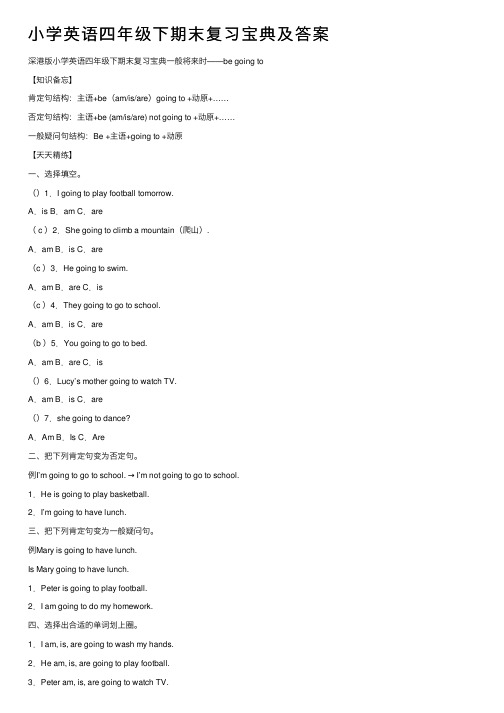
⼩学英语四年级下期末复习宝典及答案深港版⼩学英语四年级下期末复习宝典⼀般将来时——be going to【知识备忘】肯定句结构:主语+be(am/is/are)going to +动原+……否定句结构:主语+be (am/is/are) not going to +动原+……⼀般疑问句结构:Be +主语+going to +动原【天天精练】⼀、选择填空。
()1.I going to play football tomorrow.A.is B.am C.are( c )2.She going to climb a mountain(爬⼭).A.am B.is C.are(c )3.He going to swim.A.am B.are C.is(c )4.They going to go to school.A.am B.is C.are(b )5.You going to go to bed.A.am B.are C.is()6.Lucy’s mother going to watch TV.A.am B.is C.are()7.she going to dance?A.Am B.Is C.Are⼆、把下列肯定句变为否定句。
例I’m going to go to school. → I’m not going to go to school.1.He is going to play basketball.2.I’m going to have lunch.三、把下列肯定句变为⼀般疑问句。
例Mary is going to have lunch.Is Mary going to have lunch.1.Peter is going to play football.2.I am going to do my homework.四、选择出合适的单词划上圈。
1.I am, is, are going to wash my hands.2.He am, is, are going to play football.3.Peter am, is, are going to watch TV.4.We am, is, are going to clean our house.5.They am, is, are going to work.五、把下列句⼦变为⼀般将来时。
PEP小学英语总复习资料(精华版)
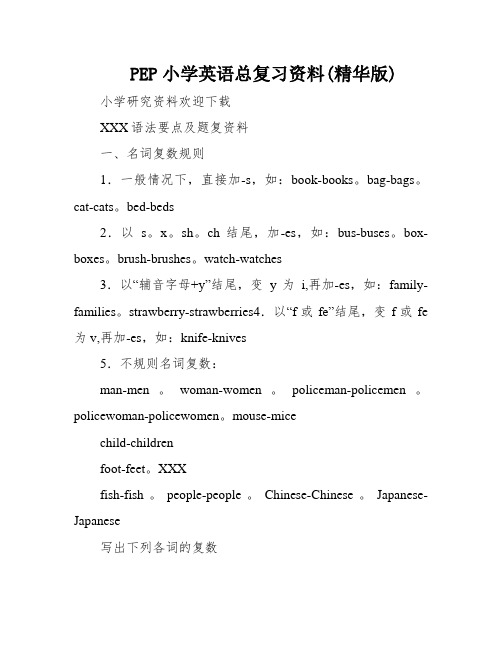
PEP小学英语总复习资料(精华版)小学研究资料欢迎下载XXX语法要点及题复资料一、名词复数规则1.一般情况下,直接加-s,如:book-books。
bag-bags。
cat-cats。
bed-beds2.以s。
x。
sh。
ch结尾,加-es,如:bus-buses。
box-boxes。
brush-brushes。
watch-watches3.以“辅音字母+y”结尾,变y为i,再加-es,如:family-families。
strawberry-strawberries4.以“f或fe”结尾,变f或fe 为v,再加-es,如:knife-knives5.不规则名词复数:man-men。
woman-women。
policeman-policemen。
policewoman-policewomen。
mouse-micechild-childrenfoot-feet。
XXXfish-fish。
people-people。
Chinese-Chinese。
Japanese-Japanese写出下列各词的复数I____him___this_____her______watch______child_______p hoto________diaryday________foot________book_______dress_ _______tooth_______sheepbox_______strawberry_____thief____ peach______sandwich______man______woman____二、一般现在时一般现在时基本用法介绍No。
1】普通目前时的功用1.表示事物或人物的特征、状态。
如:The sky is blue.天空是蓝色的。
2.表示经常性或惯性的动作。
如:I get up at six every day.我每天六点起床。
3.表示客观现实。
如:The earth goes around the sun.地球绕着太阳转。
小学英语复习宝典答案
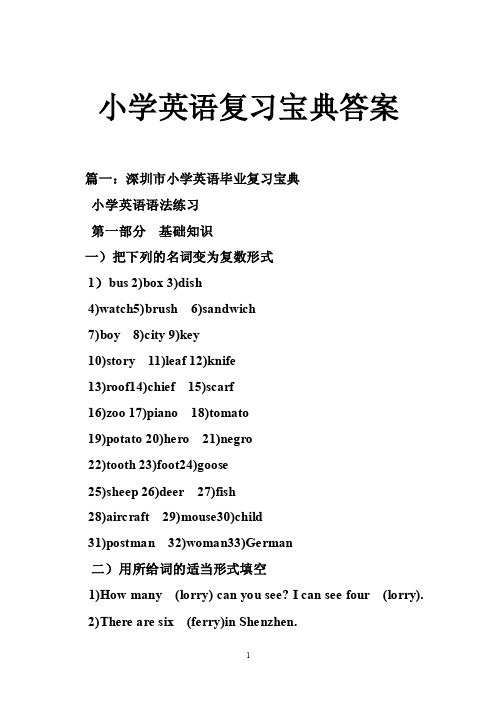
小学英语复习宝典答案篇一:深圳市小学英语毕业复习宝典小学英语语法练习第一部分基础知识一)把下列的名词变为复数形式1)bus 2)box 3)dish4)watch5)brush 6)sandwich7)boy 8)city 9)key10)story 11)leaf 12)knife13)roof14)chief 15)scarf16)zoo 17)piano 18)tomato19)potato 20)hero 21)negro22)tooth 23)foot24)goose25)sheep 26)deer 27)fish28)aircraft 29)mouse30)child31)postman 32)woman33)German二)用所给词的适当形式填空1)How many (lorry) can you see? I can see four (lorry).2)There are six (ferry)in Shenzhen.3)There are many (sheep) and (deer) on the grass.4)Canada, America, Italy and Russia are all foreign (country).5)In the street there are many big (mouse).6)Mr Zhang and Liu are both (postman).7)Mark and David are are (German).8)We are (Chinese). They are (Japanese).9)China has many large (city). Shanghai is one of thebiggest (city) in China.10)Hello, Mr Wang. How many (child) do you have?I have one (child).11)I like listening to (story).12)How many (family) are there in the village? Thereare 99.13)How many (time) did you go to Shenzhen museum?14)I want to buy some (milk)and (vegetable).15)There is much (rubbish) on the floor.16)How many (kilo) of apples do you want?17)In Autumn, there are lots of (leaf) fall.18)I like (potato). But I don’t like (tomato).19)Here is an ox. There are three (ox) over there.20)I’m too thirsty. Please give me two (glass) of drink.One is tea. The oth(转载于: 小龙文档网:小学英语复习宝典答案)er is juice.三)把下列名词的数量译成英语1)一块肉2)一瓶水3)一盒牛奶4)一碗汤5)一则新闻6)一张纸7)两斤牛肉8)两瓶油9)三杯果汁10)四包巧克力11)两公斤猪肉12)两盆水四)用名词所有格的适当形式填空1)This is(Kate) book. That is(Tim) pencilcase.2)My(parents) clothes are hanging in the wardrobe.3)He is a friend of my(father).4)It’s(Lily and Lucy) new house.5)Whose are these dolls? They are(Pat).6) My(mother) and(sister) dresses arecheap.7) The light bedroom is light.8)The entrance supermarket is the first floor.9)The key the door is lost.10)The answer this question is very easy.一)用冠词填空(不填的打×)1)Hello, T om, let’s go toschool. OK, let’sgo.2)Look, what is he doing? He is eating apple.3)Look atugly girl. She is T om’s sister.4)There iscat under the table. There isdog behind the door.5) old ,man is my father. He isdoctor..6) China isbig country.7) USA is big country, too.8)I sawbird, butbird is yellow.9)I sawold man. old man was T om’sgrandpa.10)I like playingpiano. Billy likes playingfootball.11)This islargest supermarket in the city.12) Sunday is the first day of a week.13)This is picture.There ishouse inpicture.house is besidebus.There isold man in front ofhouse.14)Can you playvolleyball well?15) Chongqi is the largest city in China.二)选择填空1)I want to behonest student.A.aB.anC.theD.×2)There isart room in our school.A.aB.anC.theD.×3)This is“f”. It’s in “life”.A.aB.anC.theD.×4)I sawold man in the street.A.aB.anC.theD.×5)Billy isEnglish teacher. He isgood teacher.A.a,anB.an,aC.an,anD.the,a6)Let’s go out forwalk.A.aB.anC.theD.×7)The park is very far. It will take ushour to get there.A.aB.anC.theD.×8)Monkey King isfamous story. And it is interesting story.A.the,theB.an,anC.an,aD.a,an9) sun isstar. It is bright and huge.A.aB.anC.theD.×10)I knowold man. old man is T om’s grandpa.篇二:小学英语四年级下期末复习宝典及答案深港版小学英语四年级下期末复习宝典一般将来时——be going to【知识备忘】肯定句结构:主语+be(am/is/are)going to +动原+…… 否定句结构:主语+be (am/is/are) not going to +动原+…… 一般疑问句结构:Be +主语+going to +动原【天天精练】一、选择填空。
- 1、下载文档前请自行甄别文档内容的完整性,平台不提供额外的编辑、内容补充、找答案等附加服务。
- 2、"仅部分预览"的文档,不可在线预览部分如存在完整性等问题,可反馈申请退款(可完整预览的文档不适用该条件!)。
- 3、如文档侵犯您的权益,请联系客服反馈,我们会尽快为您处理(人工客服工作时间:9:00-18:30)。
两种物主代词的不同用法
名词性物主代词应单独使用,后面不跟名词
1 This is my book.
The book is mine.
mine = my book 2 That is her bike.
The bike is hers. hers = her bike
小结:形容词性物主代词+名词=名词性物主代词
don't— do not wasn't —was not weren't —were not
let's—let us he's —he is\was we'll — we will
who's —who is I'd— I would that's —that is
词形变化集锦
speak(名词)——speech real(副词)——really
人称代词主格在句中作主语,位于动词前。 I am a teacher. You like music. He is playing football.
人称代词宾格在句中作宾语,位于动词后(介词 后)。
Give me an orange, please. These apples are for them.
复数 ourselves yourselves themselves
形式
-self(单数) -selves(复数)
构成
物主代词+-self / -selves 第一、二人称
wind(形容词)——windy
knife(复数)——knives
happy(名词)——happiness
one(序数词)——first three(序数词)——third
two(序数词)——secend sheep(复数)——sheep
knife(复数)——knives tomato(复数)——tomatoes
反义词集锦1
fat — thin well — badlly laugh — cry
sad — happy up — down sit — stand often—sometimes same —different clean — dirty why — because fast— slow sorry— thank lovely — naughty stay— leave heavy — light long — short good — bad tall — short
his her its his hers its
第一 第二 第三 人称 人称 人称
our your their
ours yours theirs
两种物主代词的不同用法:
1)形容词性物主代词用来修饰后面的名词,不能单独应用:
This is my book. That is her bike.
小结:形容词性物主代词+名词
物主代词
形容词性 名词性
物主代词
表示“我的”、“你的”、
物主代词: “他的”、“她的”、“它
的”、“我们的”、“你们 的”、“他们的”等的词。
形容词性物主代词和名词性物 主代词
数
单数
复数
人 第 一 第二 名 称 人 称 人称 称
主形词格容性 my your
名
宾词格 mine yours
格性
第三 人称
3 -- Whose pen is it? Is it Mike’s?
-- Yes, it is _h_is__. (he)
【粉墨登场】
• 英语中共有八个反身代词,在使用时应注意和 它所指的相应的对象在人称、性别、数上保持 一致。其基本形式如下表所示:
第一人称 第二人称
第三人称
单数
myself
yourself himself herself itself
friend(形容词)——friendly wind(形容词)——windy
sun(形容词)——sunny rain(形容词)——rainy
noice(形容词)——noisy luck(形容词)——lucky
cloud(形容词)——cloudy care(形容词)——careful
actor(动词)——act
反义词集锦2
wrong — right come — go always —never on — under\off white — black dry — wet dark — bright start — finish hot — cold cool — warm east — west south — north old —new\young big — small
I — eye
aren't — aunt
who's —whose pear— pair see —sea
全称集锦
can't— can not aren't — are not it's — it is
I'm t — is not
no— know right — write they're —they are
同音词集锦
passed — past sent— cent too — two\to our — hour where — wear
son — sun
ate — eight meet —meat
no— know right — write hear —here
for — four T — tea
buy — bye\by there — their
代词
代词的种类
主格
人称代词
宾格
代
词 形容词性
物主代词
名词性
人称代词主格和宾格
数
单数
复数
人 第 一 第二 第三 第一 第二 第三 格 称 人 称 人称 人称 人称 人称 人称
he
主格
I
you
she it
宾格
me
him
you her
it
we you they us you them
人称代词主格和宾格的区别:
根据句意,用括号中所给代词的 适当形式填空。
1 -- Is this _h_e_r_ watch? -- No, it is not _h_e_rs_. (she)
2 -- There are two rulers on the desk.
Which one is y_o_u_r_s ? (you) -- _M_y__ ruler is red. The red one is _m_i_n_e. (I)
